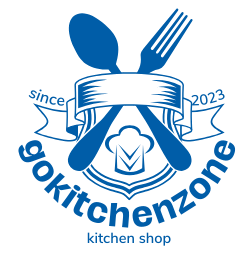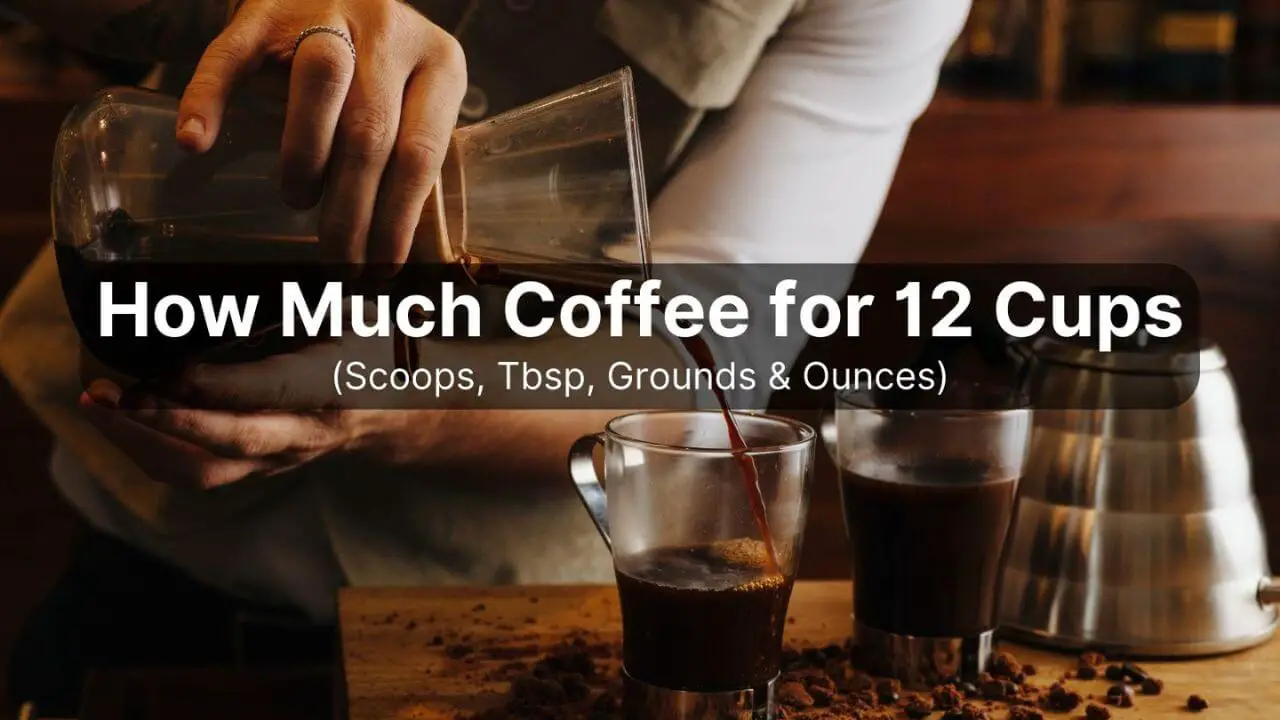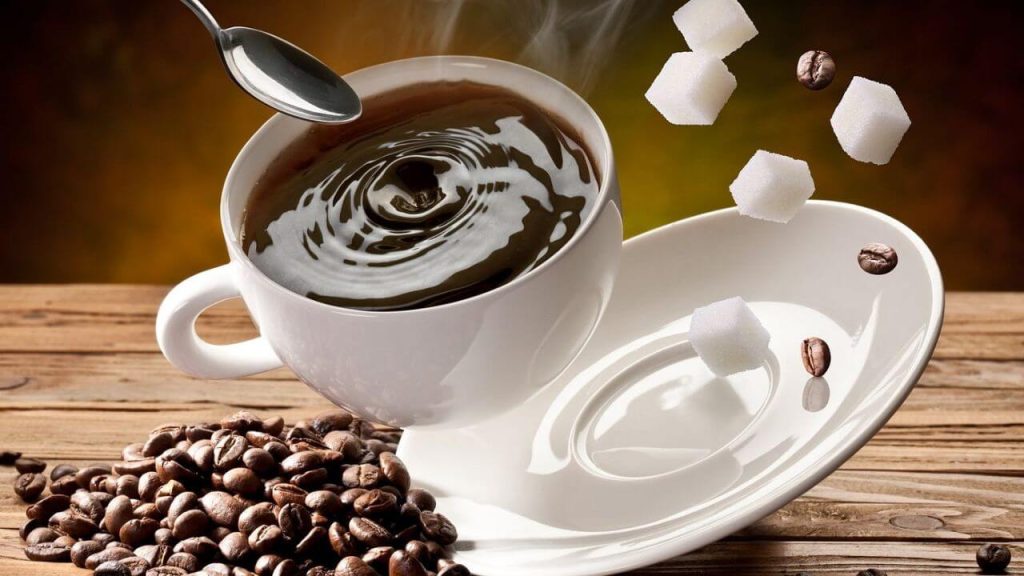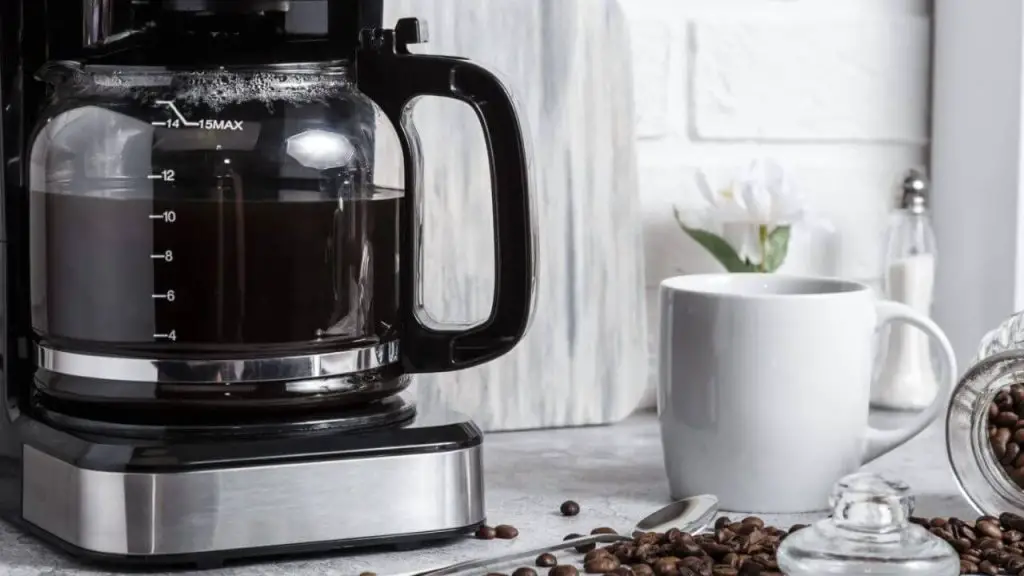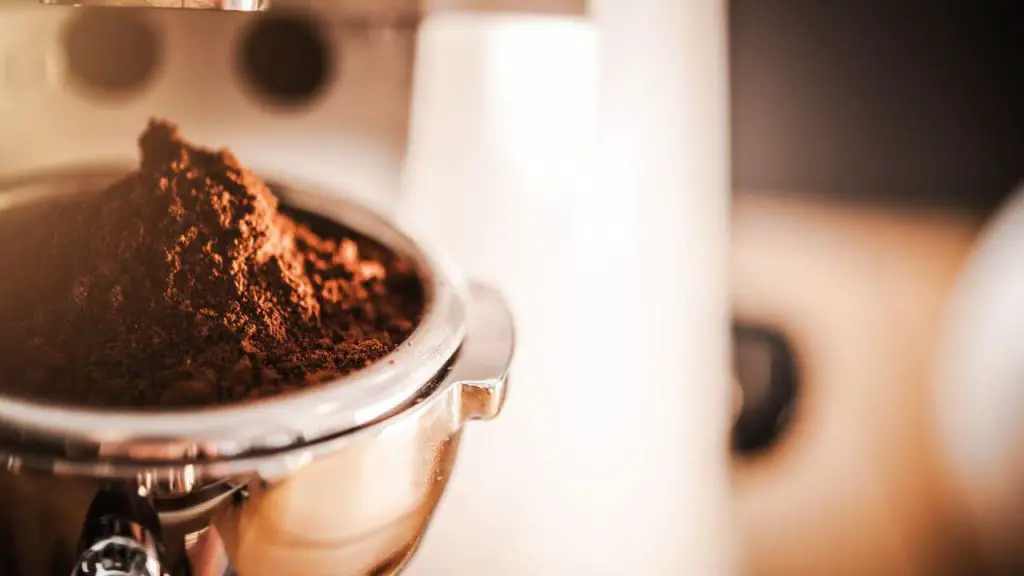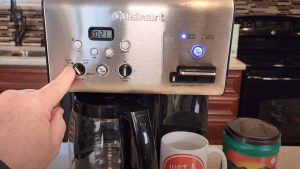For 12 cups of coffee, you typically need 12 scoops of coffee. Each cup of coffee usually requires one level scoop of coffee grounds.
Crafting the perfect pot of coffee is both an art and a science, particularly regarding measurements. Anyone looking to brew a full 12-cup carafe should understand the importance of getting the right coffee-to-water ratio for the perfect strength and flavor. Regular drip coffee makers often suggest one tablespoon of coffee per 6 ounces of water, which translates roughly to one standard coffee scoop per cup.
This standard provides a starting point but leaves room for personal taste adjustments. Whether you prefer a bold, dark roast or a smoother, light blend, the key lies in the consistency of your measurements. Mastering this simple coffee principle ensures a delightful start to the day or a comforting mid-afternoon pick-me-up for coffee lovers everywhere.
The Perfect Ratio: Scoops To Cups
Creating a tempting cup of coffee is an art. It starts with the perfect balance of coffee and water. Get this right, and each sip is heavenly. The scoop-to-cup ratio is crucial for that dream brew. Every coffee lover deserves to know this secret formula.
Finding The Balance: Taste And Strength
The quest for the ideal coffee strength is personal. Bold flavor or a light touch, coffee varies with scoop count. Taste buds rejoice with 1 to 2 scoops per 6 ounces of water—the sweet spot. Depending on enthusiasm, 12 cups are about 16 to 32 scoops.
- Mild: Go for fewer scoops, enjoy subtler notes.
- Rich: More scoops, dive into deeper flavor.
Standard Measurements: Scoop Sizes Explained
Scoop size matters. A standard coffee scoop equals two tablespoons. That’s about 10 grams of ground coffee. Check your scoop and adjust the count for a full pot.
| Cups of Coffee | Scoops (Mild) | Scoops (Strong) |
| 12 | 16 | 32 |
Always use fresh, quality beans. Grind size also changes the game. A fine grind, for a stronger brew; a coarse grind, for a lighter cup. Start with these ratios, then tweak to taste.
Coffee Types And Their Ideal Measurements
Crafting the perfect cup of coffee starts with understanding the right measurements. Different coffee types require specific amounts of coffee grounds to brew a balanced cup. To make 12 cups of coffee, precision is key. Each coffee type, from single-origin to blends and various roasts, has its ideal measurements. Whether you prefer a light, medium, or dark roast, finding that perfect scoop size can elevate your coffee experience.
Single-origin Versus Blended
Single-origin coffee boasts a unique flavor from its specific region. For 12 cups, you need 12 to 24 scoops, depending on taste. Blends combine beans for a consistent flavor. Usually, 12 scoops suffice for a balanced taste.
Light, Medium, And Dark Roasts
Light roast coffee often has a milder taste. Start with 12 scoops for a delicate flavor. The medium roast is balanced and requires 12 scoops for 12 cups. Dark roast is robust; 12 to 18 scoops deliver a strong brew.
| Type of Coffee | Scoops for 12 Cups |
| Single-Origin | 12 to 24 (to taste) |
| Blended | 12 |
| Light Roast | 12 |
| Medium Roast | 12 |
| Dark Roast | 12 to 18 (for strength) |
- Measure accurately for perfect taste.
- Adjust scoops according to coffee type and preferred strength.
Brewing Methods: Impact On Scoop Size
Mastering the perfect cup of coffee starts with knowing the right scoop size. Different brewing methods require unique measurements. Understanding these can transform your homebrew. Let’s delve into how brewing methods affect scoop size.
Drip Brewing Versatility
Drip brewing is a popular choice for coffee lovers. It’s known for its convenience and consistency. But did you know the amount of coffee can change the taste? The golden ratio for drip machines is one to two tablespoons per six ounces of water. That equates to approximately 12 to 24 tablespoons for 12 cups. Here’s a quick guide:
- Light coffee: Use one tablespoon per cup.
- Strong coffee: Go for two tablespoons.
French Press Considerations
French Press brewing is an art. It calls for a coarser grind and a varied coffee-to-water ratio. Aim for a starting point of one tablespoon for four ounces of water. For 12 cups, you would need about 24 tablespoons. This ensures a bold and rich flavor synonymous with French Press coffee. Personal preference guides the exact measurement. Experiment to find your perfect scoop. Start with these suggestions:
| Cups of Water |
Scoops of Coffee |
| 12 | 24 |
| 10 | 20 |
Remember: each scoop should be heaping, not level.
Grind Size, A Crucial Factor
Making the perfect 12 cups of coffee is an art. The grind size of your coffee beans is a key player. Different grinds interact with water uniquely. This affects the strength and flavor of your coffee. Understanding grind size ensures a great coffee experience.
Coarse Grinds And Their Effect
Coarse grinds are chunky and have a texture similar to sea salt. Their larger particles allow water to flow easily. This results in a smoother, lighter cup perfect for French presses and cold brews.
- Less surface area exposed to water
- Extended brewing time
- Mild flavor extraction
For 12 cups, start with 9-10 scoops of coarse grind coffee. Adjust to taste.
Fine Grinds For A Stronger Cup
Fine grinds work magic for those who enjoy a bold, robust cup. They’re powdery, like table salt. They pack tightly into a filter, slowing water passage. This maximizes the extraction of flavor.
- More surface area in contact with water
- Quicker brewing time
- Intense flavor
Use about 12 scoops of fine-grind coffee for 12 cups. Taste and tune accordingly. Remember, adjustments are natural in search of your perfect cup!
| Grind Size to Scoops Guide | |
| Grind Size | Scoops (for 12 cups) |
| Coarse | 9-10 |
| Fine | ~12 |
Water Quality And Temperature
Getting the perfect brew is about more than just measuring the right amount of coffee for your 12-cup pot. The water you use and the heated temperature are critical in extracting the full flavor from your coffee grounds.
The Importance Of Purity
Chlorine, minerals, and other impurities in water can affect your coffee’scoffee’sUsing filtered or bottled water ensures that nothing but the coffee’scoffee’s flavors come through. Clean water makes a significant difference.
- Avoid tap water if it’s hart’s has a noticeable taste or smell.
- Consider a water filter to remove unwanted chemicals and improve taste.
- Bottled water can be a good alternative but check for balanced mineral content.
Optimal Temperature For Extraction
Heat is crucial to a great cup of coffee. The ideal water temperature for brewing is between 195°F to 205°F. Temperatures below this range can result in under-extracted coffee, while higher temperatures can burn the coffee.
| Under-Extraction | Optimal Extraction | Over-Extraction |
| Below 195°F | 195°F – 205°F | Above 205°F |
Remember, an accurate thermometer can ensure you’re in the optimal range. Consider preheating your water with a kettle if your coffee maker doesn’t reach these temperatures.
- Measure water temperature with a thermometer.
- Preheat water if necessary.
- Maintain steady heat during brewing for the best flavor.
Scaling Up: Techniques For Larger Batches
Crafting the perfect large batch of coffee demands a keen eye for detail. Whether for a family gathering or a busy office, understanding how to scale up your coffee-making approach ensures every cup is as delightful as the last. Let’s explore how to achieve consistency and cater to group preferences.
Consistency In Multiple Batches
Consistency is king in coffee brewing. To maintain uniform taste across batches, here’s what you should know:
- Measure Precisely: Use a digital scale for coffee grounds to ensure accuracy.
- Temperature Control: Keep water at a consistent temperature, around 195°F to 205°F.
- Grind Size Matters: Evenly grind coffee beans for uniform extraction.
- Stir Gently: Stir the grounds in the brewer to promote even saturation.
Apply these tips, and every brew will be just right. Adjusting for Group Preferences
Adjusting For Group Preferences
Group tastes vary. To please the crowd, here’s a simple plan:
- Start with a standard ratio of 1 to 2 tablespoons of coffee per 6 ounces of water.
- Observe Reactions: Gather feedback on the coffee’s strength and flavor.
- Make Adjustments: Increase or decrease the amount of coffee slightly.
This ensures you get that just-right balance to suit everyone’s taste.
Timing And Steeping: Brewing To Perfection
Making the perfect cup of coffee is an art. It blends precision in measurement with careful timing. For those brewing 12 cups, understanding the significance of brewing time and the steeping process is key. Let’s dive into how these elements influence your coffee’s taste.
The Significance Of Brewing Time
Brewing time affects your coffee’s flavor and strength. Each second matters. For a well-balanced brew, here’s what to consider:
- Quick Brew: Around 4-5 minutes may lead to weak coffee.
- Ideal Brew: 5-6 minutes is perfect for rich, bold coffee.
- Long Brew: Over 6 minutes might cause bitterness.
Stick to the ideal timeframe for coffee that impresses you.
Steeping: A Delicate Process
The steeping process is when coffee grounds interact with water. It’s essential for flavor extraction. Follow these steps for optimal steeping:
- Add the right amount of coffee grounds for 12 cups.
- Pour hot water, not boiling, evenly over the grounds.
- Allow the coffee to steep during the brewing process.
- Adjust steeping time based on the desired strength.
Proper steeping leads to a coffee experience that’s rich and satisfying. Remember, steeping is a delicate process—master it for the best taste.
Customizing Strength And Flavor
Are you eager to craft the perfect cup of coffee for your tastes? Customizing strength and flavor is an art. Finding the right balance means understanding how many scoops of coffee will make your ideal 12 cups. Each variation brings unique depth and richness. Let’s explore how to tailor coffee strength and taste to your preference.
Manipulating Scoop Count
Every scoop you add changes the game. More scoops mean a richer, robust flavor. Fewer lighten the brew. The standard guide is one scoop per cup. But who says you need to play by the rules? Customize away! Let’s crunch some numbers:
- Mild lovers: Start with 9-10 scoops for 12 cups.
- Regular folks: Stick with 12 scoops.
- Strong seekers: Go for 15 or more scoops.
Incorporating Flavor Enhancers
Do you desire something extra in your cup? Flavor enhancers can transform your coffee. Think beyond sugar and cream. Spices and extracts make coffee a sensory experience. Consider these additions:
| Enhancer | Amount for 12 Cups |
| Cinnamon | A pinch to 1/2 tsp |
| Vanilla Extract | 1/2 to 1 tsp |
| Cocoa Powder | 1 to 2 tsp |
Blend enhancers into ground coffee before brewing. This ensures flavors meld beautifully. Start small with these additives. Taste and adjust. Your perfect cup awaits!
Troubleshooting Common Brewing Errors
Making the perfect cup of coffee is an art. But even the most skilled artists can have an off day. Sometimes, the coffee brewed at home needs to hit the mark. A common issue when brewing a large pot, like 12 cups, is getting the strength right. Let’s troubleshoot these brewing errors to get back to coffee heaven.
Weak Or Overpowering Results
Nobody enjoys a weak or overpowering cup of coffee. It’s frustrating when you expect a robust taste and get a watery mess or look for a gentle wake-up but find a bitter brew instead. Don’t worry; these issues are fixable with a few tweaks to your process.
- Check your coffee scoop size: Standard is approximately two tablespoons.
- Examine coffee grounds: Coarse for French Press, fine for espresso.
- Water quality is key: Use filtered water for the best taste.
- Clean equipment ensures no leftover residue affects flavor.
Remember, for 12 cups of coffee, you’ll typically want about 24 tablespoons of ground coffee or about 12 scoops if using the standard coffee scoop.
Adjusting Scoop Size Vs. Brewing Method
The brewing method can also affect the coffee’s strength.
- For drip brewers, a medium grind works best.
- French Press users should opt for a coarse grind and adjust their steep time.
- Espresso machines prefer a fine grind and less brewing time.
If your coffee needs to be perfect, consider adjusting the scoop size before changing your brewing method. It’s a simpler tweak and often solves the problem. Experiment with slightly more or less coffee rather than a full extra scoop. Adjust in small increments for precision. Use a scale for the most accurate measurements. This means 10-12 grams per cup, so about 120-144 grams for 12 cups. Precision leads to consistency!
Mastering Measurement For Coffee Aficionados
Welcome, coffee enthusiasts, to the art of precision in brewing a perfect pot! Mastering measurement is crucial for crafting a consistent coffee experience. Explore tools and tips to measure coffee just right every time.
Tools Of The Trade: Scales And Scoops
To achieve coffee greatness, you need the right tools. In this quest, precise scales and consistent scoops shine bright. Let’s dive into each:
- Digital Scales: Weigh coffee with accuracy. Aim for 0.1g precision for best results.
- Measuring Scoops: Use standardized scoops. Each scoop should hold about 10g of coffee.
Choose tools that feel right for you. Look for a user-friendly scale and a scoop that’s easy to handle.
The Journey To The Ideal Cup
Finding the sweet spot for a 12-cup pot involves some math. Here’s a quick guide:
| Cups of Coffee | Water (Ounces) | Coffee (Grams) | Scoops (Using a Standard 10g Scoop) |
| 12 | 96 | 180 | 18 |
Follow this guide for a balanced brew. Adjust to taste, but start here for a solid foundation.
Frequently Asked Questions On How Many Scoops Of Coffee For 12 Cups
How Much Coffee Per 12 Cups?
To brew 12 cups, you’ll need approximately 24 tablespoons (1. 5 cups) of ground coffee, which equals about one tablespoon per cup.
Is There A Ratio For Coffee-to-water?
Yes, the golden ratio for coffee is 1 to 2 tablespoons for every 6 ounces of water.
Can You Use Too Much Coffee For Brewing?
More coffee can lead to a bitter, over-extracted brew, while more results in a strong, underwhelming cup.
What Affects Coffee Strength?
The coffee-to-water ratio, grind size, brewing time, and water temperature influence coffee strength.
Does Grind Size Matter For Coffee?
Grind size is crucial; finer grinds are for quick extraction methods like espresso, and coarser grinds are for slow-brew methods like French press.
How To Measure Coffee For A Large Pot?
Use a standard coffee scoop or a digital scale for precise measurements: 1 scoop or two tablespoons per 6 ounces of water.
Is Filtered Water Better For Coffee?
Filtered water can improve your coffee’s taste by removing contaminants that might interfere with the coffee’s natural flavors.
Do Coffee Beans’ Freshness Matter?
Fresher coffee beans produce a more aromatic and flavorful cup than stale beans, which produce a flat taste.
What Is The Best Coffee Storage Method?
Store coffee in an airtight container in a cool, dark place to maintain its freshness and prevent flavor loss.
Can I Reuse Coffee Grounds?
Reusing coffee grounds is not recommended as most flavors are extracted in the first brew, resulting in a weak second cup.
Conclusion
Crafting the perfect cup of coffee is both an art and a science. To serve 12 delightful cups, you’ll need roughly 24 tablespoons of your favorite ground coffee. Experiment to find your ideal balance and enjoy the aromatic bliss in every sip. Get brewing and savor the flavors, whether it’s your morning eye-opener or an evening treat scoops of Coffee for 12 Cups.
